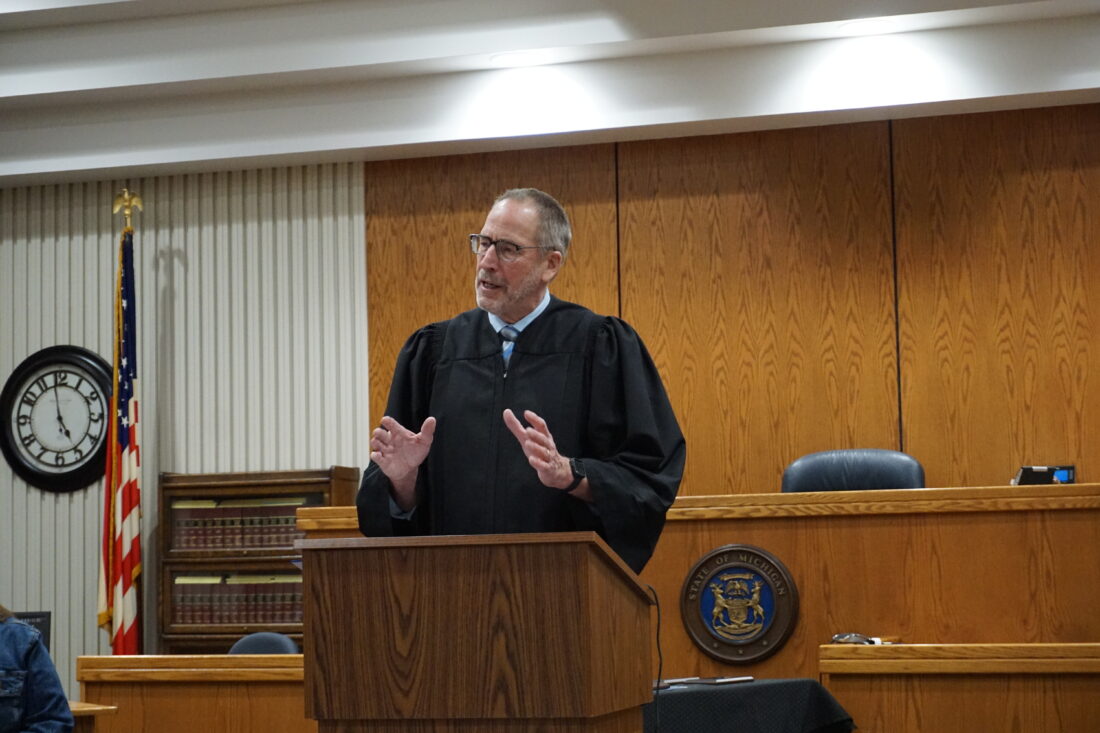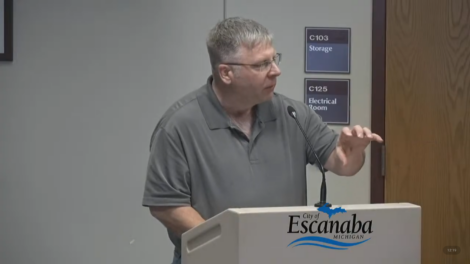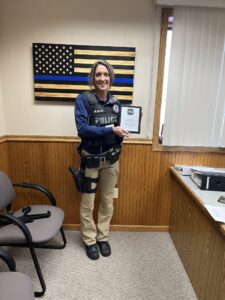Delta County Drug/Sobriety Court reaches 53 grads

The Delta County Drug/Sobriety Court had a graduation ceremony Nov. 10 in the 47th Circuit Courtroom in Escanaba for two individuals who successfully completed the program. Judge Steve Parks of the 94th District Court, founder of the program, spoke at the ceremony. (Sophie Vogelmann | Daily Press)
ESCANABA – Almost every seat was filled in the Delta County 47th Circuit Courtroom to celebrate the 16th Delta County Drug/Sobriety Court graduation ceremony.
Two individuals graduated Nov. 10, marking a total of 53 to complete the program.
Judge Steve Parks of the 94th District Court, founder of Drug/Sobriety Court, spoke on the meaning of the ceremony.
“We see people that come in that are in the worst time of their life, many times bottomed out, hopeless,” Parks said. “Many of them have expressed thoughts in the past of self-harm, feeling like they weren’t worthy of being around anymore. These two (graduates) are representatives of having gone in those really dark places and having the courage and the resilience to be here today. It’s an honor, because not everybody that comes into the program graduates.”
The two graduates each gave testimonials on their addiction and experiences in the program. Both received plaques and certificates.
The audience also heard from Kristy Mykkanen, a peer recovery coach and case manager at Great Lakes Recovery Centers Inc. in Negaunee.
At the end of the ceremony, Parks discussed a study that showed giving back to the community improves self-esteem and self-worth.
“There are some benefits here, too. But what’s cool is these two (graduates) aren’t thinking about the benefits. They’re receiving the benefits, but they didn’t do this because of the benefits. They did this because they felt like this was something they needed to do. And it’s a beautiful thing to see,” Parks said.
Parks thanked Delta County 47th Circuit Court Judge John Economopoulos for lending his courtroom to them for the night, and he noted the lengthy list of team members working on the Delta County Drug/Sobriety Court.
The Drug/Sobriety Court is a grant-funded program that requires a probationary period of 24 months, but participants may be considered for graduation after 15 months. The program has the capacity to hold 20 members at a time.
High risk/high need drug and alcohol offenders who find themselves in Circuit Court may be sentenced to Drug/Sobriety Court. A high risk/high need individual in court is someone with a severe substance use disorder who also presents a substantial likelihood of re-offending or failing in standard probation programs due to a range of complex mental health issues and life circumstances. These individuals typically require the intensive supervision and comprehensive services that the drug court model provides.
To be admitted into the program, most often there is a drug or alcohol offense involved. But that is not required for admittance. Some offenses arise from alcohol or drug addictions, like retail fraud, for example. Offenders in District Court may also enter the program.
The Delta County Drug/Sobriety Court program requires certain standards and rules that include rigorous probationary terms, performing drug tests up to three times a week, attending self-help programs and substance abuse counseling, and meetings with court officers. Later in the program, participants are expected to file three job applications a week.
Those who don’t comply face a variety of sanctions, including jail time, discharge from the program and imposition of any delayed or suspended sentence.
The Drug/Sobriety Court was part of Parks’ campaign about 12 years ago to become district court judge after serving as a prosecutor. The repeat offenders he saw come in and out of the court and correctional system made him realize Delta County needed a change.
Parks and his team in the Drug/Sobriety Court, which ranges from counselors, police officers, medical professionals and even the prosecutor, meet every other week to discuss each person on a case-by-case basis. They look at progress made, events that could potentially set treatment back such as the death of a loved one, underlying factors or traumas that could contribute to their addictions and more.
Michigan had 135 Drug/Sobriety Courts as of 2022, according to the State Court Administrative Office. There are thousands of Drug/Sobriety Courts throughout the country.
According to the Michigan Association of Treatment Court Professionals, the state’s first drug court started in Kalamazoo County Circuit Court. In fact, MATCP, a 501(c)(4) nonprofit, was founded in 1996 by the first drug and sobriety court members.





